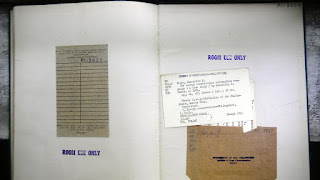Linkedin, a social network for professionals prompted me to
add any academic work I did in college in my profile to enhance it. I remembered
my thesis, a descriptive and exploratory a case with a survey which I designed, executed, manually typed and defended.
That was decades ago. How else can I retrieve the file if it
was not saved in an electronic copy?
It brought me back to my college library at UP Diliman. Fortunately, it had on file a list of thesis and dissertations accepted by the Dean. The works have been cataloged with an assigned call number including mine. But only those submitted in the 1980s and beyond were on the shelf. The rest was turned over to the UP Main Library archive. The college librarian listed down my call number and informed the staff at the Main Library archive to locate my work in preparation for my request at the site.
After a short stroll at the college campus, I was admitted
at the entrance but only upon checking for an orange card. An orange card is
similar to an ID allowing alumni and guests use the facilities. Acknowledging
my credentials, I climbed up to the third floor where a staff member was ready with my
thesis.
Leafing through the pages, it brought back memories of my
productive and stimulating college days spent learning, studying, discovering
in a company of illustrious teachers and schoolmates. The documentation
captured in my printed thesis helped recall the interviews I made, the house to
house survey conducted and the formulation session done with fellow classmates
with our advisers.
With a copy preserved, I was able to capture the core of my works and save it electronically.
Energy Conservation Information Campaign: A Case Study LG
993.5 1976 M3 R39.
 The study was both descriptive and an exploratory.
The first part of the study was exploratory tracing the history of the Enercon
Movement and the defined organizational set-up. The information campaign on
energy conservation launched by the movement was presented expounding on the
themes, messages and campaign strategies. The second part was an exploratory study where a survey was used to determine the effects of the information
campaign to a typical urban community in Metro Manila.
The study was both descriptive and an exploratory.
The first part of the study was exploratory tracing the history of the Enercon
Movement and the defined organizational set-up. The information campaign on
energy conservation launched by the movement was presented expounding on the
themes, messages and campaign strategies. The second part was an exploratory study where a survey was used to determine the effects of the information
campaign to a typical urban community in Metro Manila.
The theoretical bases in evaluating the information campaign
were The Diffusion Theory of Everett Rogers and the Reinforcement Theory of
Hovaland, Janis and Kelly. The diffusion process is the spread of a new idea
from its source of invention to its ultimate users or adopters. Reinforcement
states that there is learning thru exposure and this exposure is heavily based
on reward and punishment.
Study presented results on the effect of the program to the
target audience in terms of influencing to save, convincing them on the need to
conserve fuel and electricity and acting on measures to conserve energy.
Other than researching my own academic work, the visit was
significant as the study, submitted in partial fulfillment for a degree was
cataloged in the UP Integrated Library System giving me the honor of having
contributed a unpublished work for other researches to refer to in the future.
The visit made me recollect those moments when reading books
was a thrill because of the learning and discovery. The facility accessible to
me then is still available now except that the manually typed book catalog has
now been replaced with an online data base.
I am not complaining though that my work has been filed at
the archive. At least it is there when I have a need to look back at the past.




No comments:
Post a Comment